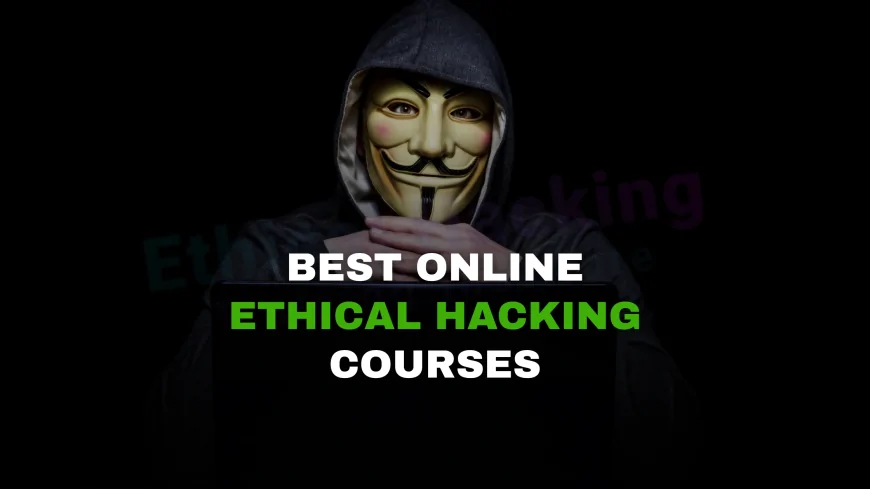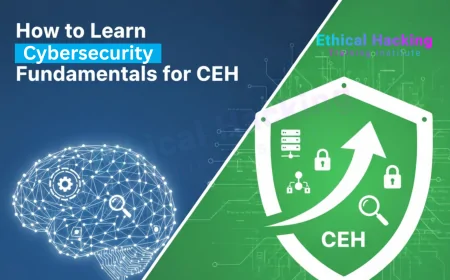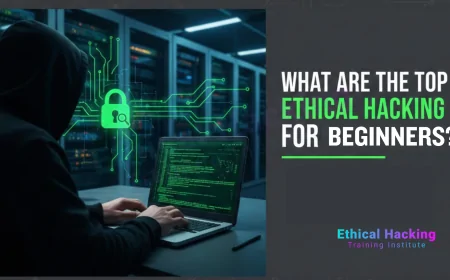Best Online Ethical Hacking Courses for 2025 | Top Online Resources to Master Ethical Hacking in 2025
Discover the best online ethical hacking courses for 2025. Learn penetration testing, cybersecurity tools, and earn top certifications like CEH and OSCP to launch your hacking career from home.

Table of Contents
- Introduction
- Why Ethical Hacking Matters in 2025
- Top Online Ethical Hacking Courses in 2025
- Comparison of Online Learning Platforms
- Popular Ethical Hacking Certifications
- Skills Covered in These Courses
- Who Should Enroll?
- Career Opportunities After Completion
- Average Salary in Ethical Hacking
- Importance of Hands-On Labs & Projects
- Free vs Paid Ethical Hacking Courses
- Recommended Learning Path
- Tips to Succeed in Ethical Hacking Courses
- FAQs
- Conclusion
Introduction
In a world increasingly dependent on digital infrastructure, ethical hacking has emerged as a powerful weapon in the fight against cybercrime. The year 2025 sees a surge in demand for cybersecurity professionals, especially those trained in ethical hacking. Fortunately, learning ethical hacking no longer requires attending expensive bootcamps or colleges. A variety of online ethical hacking courses now offer industry-recognized certifications, hands-on labs, and practical skills — accessible from the comfort of your home.
Why Ethical Hacking Matters in 2025
Cyberattacks have become more sophisticated and frequent. From ransomware to zero-day exploits, organizations are constantly under threat. Ethical hackers — or white-hat hackers — are cybersecurity experts who simulate attacks to identify and patch vulnerabilities.
In 2025:
-
Over 70% of companies report increased cyberattacks.
-
AI-powered attacks demand human oversight.
-
Ethical hackers are key to compliance with security standards like ISO 27001, GDPR, HIPAA, and PCI-DSS.
Top Online Ethical Hacking Courses in 2025
WebAsha Technologies
WebAsha Technologies is one of India’s leading cybersecurity training institutes, known for offering comprehensive, hands-on, and career-oriented ethical hacking programs. In 2025, WebAsha continues to be a top choice for students and professionals seeking online ethical hacking certification with real-world applications and expert mentorship.
Popular Ethical Hacking Courses Offered by WebAsha in 2025:
| Course Name | Level | Duration | Certification | Mode |
|---|---|---|---|---|
| Certified Ethical Hacker (CEH v12) | Intermediate | 3–4 Months | Yes (EC-Council) | Online Live + LMS Access |
| Advanced Penetration Testing | Advanced | 2–3 Months | Yes (WebAsha Certificate) | Online Instructor-Led |
| Cyber Security Fundamentals | Beginner | 1.5 Months | Yes | Self-paced + Recorded Videos |
| Bug Bounty & Web Application Hacking | Intermediate | 2 Months | Yes | Online with Practical Labs |
Key Features of WebAsha’s Ethical Hacking Programs
- Live instructor-led sessions by industry experts
- Hands-on labs using real-world scenarios
- Access to EC-Council-authorized study materials
- Support for CEH exam preparation and interview readiness
- Dedicated placement assistance and resume building
- Access to a private hacking lab environment (VPN)
- Lifetime access to recordings and LMS
Career Opportunities After WebAsha Ethical Hacking Courses
After completing a WebAsha online course, students are well-prepared for job roles such as:
- Ethical Hacker
- Cybersecurity Analyst
- Penetration Tester
- SOC Analyst (Level 1 and 2)
- Bug Bounty Researcher
Comparison of Online Learning Platforms
| Platform | Pros | Cons |
|---|---|---|
| TryHackMe | Interactive labs, gamified learning | No official certification |
| Hack The Box | Real-world simulations | Requires technical base knowledge |
| Coursera | University-grade content | Some courses are long |
| Udemy | Budget-friendly, vast variety | Variable instructor quality |
| EC-Council | Recognized globally | Expensive |
| TCM Security | Hands-on and practical | Less known than EC-Council |
| Offensive Security | Industry-respected | Challenging, not beginner-friendly |
Popular Ethical Hacking Certifications
Recognized Globally:
-
CEH (Certified Ethical Hacker) – One of the most widely recognized and beginner-friendly certifications in ethical hacking.
-
OSCP (Offensive Security Certified Professional): Technically rigorous, hands-on, and highly valued for penetration testing roles..
-
CompTIA Security+ – Beginner-level, well-known.
-
CISSP – For senior cybersecurity professionals.
-
eJPT / eCPPT – Practical certifications from INE/ElearnSecurity.
Skills Covered in These Courses
-
Network scanning and enumeration
-
Linux for hackers
-
Exploitation with Metasploit
-
SQL injection & XSS attacks
-
Wi-Fi hacking & MITM attacks
-
Password cracking
-
Social engineering tactics
-
Reporting and mitigation strategy
-
Scripting with Python/Bash
Who Should Enroll?
-
Students in IT, CS, or Electronics
-
Software Developers
-
Network and System Admins
-
Freelancers & Bug Bounty Hunters
-
Career switchers to Cybersecurity
-
Tech enthusiasts and hackers-at-heart
Career Opportunities After Completion
Career paths for ethical hacking course graduates include:
-
Ethical Hacker
-
Penetration Tester
-
SOC Analyst
-
Security Researcher
-
Vulnerability Assessor
-
Red Team Engineer
-
Application Security Analyst
Average Salary in Ethical Hacking (2025)
| Country | Entry-Level | Mid-Level | Expert |
|---|---|---|---|
| India | ₹5–7 LPA | ₹10–15 LPA | ₹18+ LPA |
| USA | $70K–$90K | $100K–$130K | $150K+ |
| UK | £30K–£45K | £55K–£70K | £90K+ |
Source: Glassdoor, Payscale, Naukri, LinkedIn 2025
Importance of Hands-On Labs & Projects
Courses with real-world projects simulate actual hacking environments:
-
Virtual Penetration Testing Labs (e.g., Hack The Box)
-
CTF (Capture The Flag) Challenges
-
Bug bounty programs
-
Building a home lab with Kali Linux
Hands-on practice is essential to mastering hacking concepts.
Free vs Paid Ethical Hacking Courses
| Type | Examples | Best For |
|---|---|---|
| Free | TryHackMe, HackTheBox (Free tiers), Cybrary | Beginners exploring the field |
| Paid | CEH, OSCP, Coursera, Udemy, TCM | Serious learners, certification seekers |
Tip: Combine both for a cost-effective, in-depth journey.
Recommended Learning Path
-
Start with basic networking and Linux knowledge
-
Learn fundamentals via Coursera/Udemy
-
Practice with TryHackMe/HTB
-
Prepare for certifications (CEH, OSCP)
-
Apply skills to bug bounties or internships
-
Build a portfolio on GitHub or a blog
Tips to Succeed in Ethical Hacking Courses
-
Spend 1–2 hours daily on hands-on labs
-
Don’t skip the theory; read about exploits
-
Build and break your own VMs to learn faster
-
Follow cybersecurity blogs & Twitter/X accounts
-
Join Discord/Reddit communities (e.g., r/netsec)
-
Take notes and revise tools regularly
Frequently Asked Questions (FAQs)
1. Which is the best online ethical hacking course for beginners?
CEH v12 and Udemy's Ethical Hacking Bootcamp are highly recommended for beginners.
2. Can I learn ethical hacking without a degree?
Yes, many top ethical hackers are self-taught through online courses and certifications.
3. Are these online courses recognized by employers?
Courses that offer certifications like CEH, OSCP, or CompTIA are widely accepted.
4. How long does it take to complete an ethical hacking course?
Most courses take between 3–6 months depending on your pace and prior knowledge.
5. What is the difference between CEH and OSCP?
CEH focuses on concepts and tools; OSCP emphasizes hands-on penetration testing skills.
6. Do these courses offer job placement support?
Some platforms offer job boards or career support, but not all guarantee placement.
7. Are there any 100% free ethical hacking courses?
Yes, platforms like TryHackMe and Cybrary have free tiers that offer valuable content.
8. Is programming required for ethical hacking?
While not mandatory, knowledge of Python, Bash, or JavaScript helps significantly.
9. Can I become a bug bounty hunter with these courses?
Yes, many courses prepare you for bug bounty programs like HackerOne or Bugcrowd.
10. Are ethical hacking courses suitable for students?
Absolutely! Many students start their cybersecurity career by taking online courses.
11. Which online platform offers the most hands-on labs?
TryHackMe and Hack The Box are renowned for practical lab environments.
12. What kind of laptop do I need for learning hacking?
A system with at least 8GB RAM, 64-bit OS, and virtualization support is ideal.
13. Are ethical hacking courses updated for AI threats?
Yes, some advanced courses now include modules on AI-powered attacks and defenses.
14. Can I pursue ethical hacking part-time?
Yes, online courses are self-paced, allowing you to learn alongside work or study.
15. How much do paid certifications like CEH or OSCP cost?
CEH can cost around $1200; OSCP may cost up to $1500 depending on packages.
16. Are there hacking simulators in these courses?
Yes, platforms like TryHackMe and HTB offer real-world attack simulation environments.
17. What is the best free tool for penetration testing?
Kali Linux, an open-source OS, is loaded with ethical hacking tools and is widely used.
18. Will I get a certificate after completing these courses?
Most paid courses offer a certificate of completion or recognized certification exam.
19. How do I prove my hacking skills to employers?
Maintain a GitHub repo, participate in CTFs, and share bug bounty reports if any.
20. Is ethical hacking a good career choice in 2025?
Yes, it's one of the fastest-growing IT fields with global demand and high salaries.
Conclusion
Ethical hacking is a highly rewarding career path that plays a vital role in defending the digital world. With dozens of online platforms and certifications available in 2025, you can gain practical hacking skills and become a certified professional—all from the comfort of your home. Start with foundational knowledge, choose the right online course, get hands-on with labs, and pursue certifications to enter this dynamic, in-demand field. The time to learn, hack, and secure is now.
What's Your Reaction?
 Like
0
Like
0
 Dislike
0
Dislike
0
 Love
0
Love
0
 Funny
0
Funny
0
 Angry
1
Angry
1
 Sad
0
Sad
0
 Wow
0
Wow
0

















